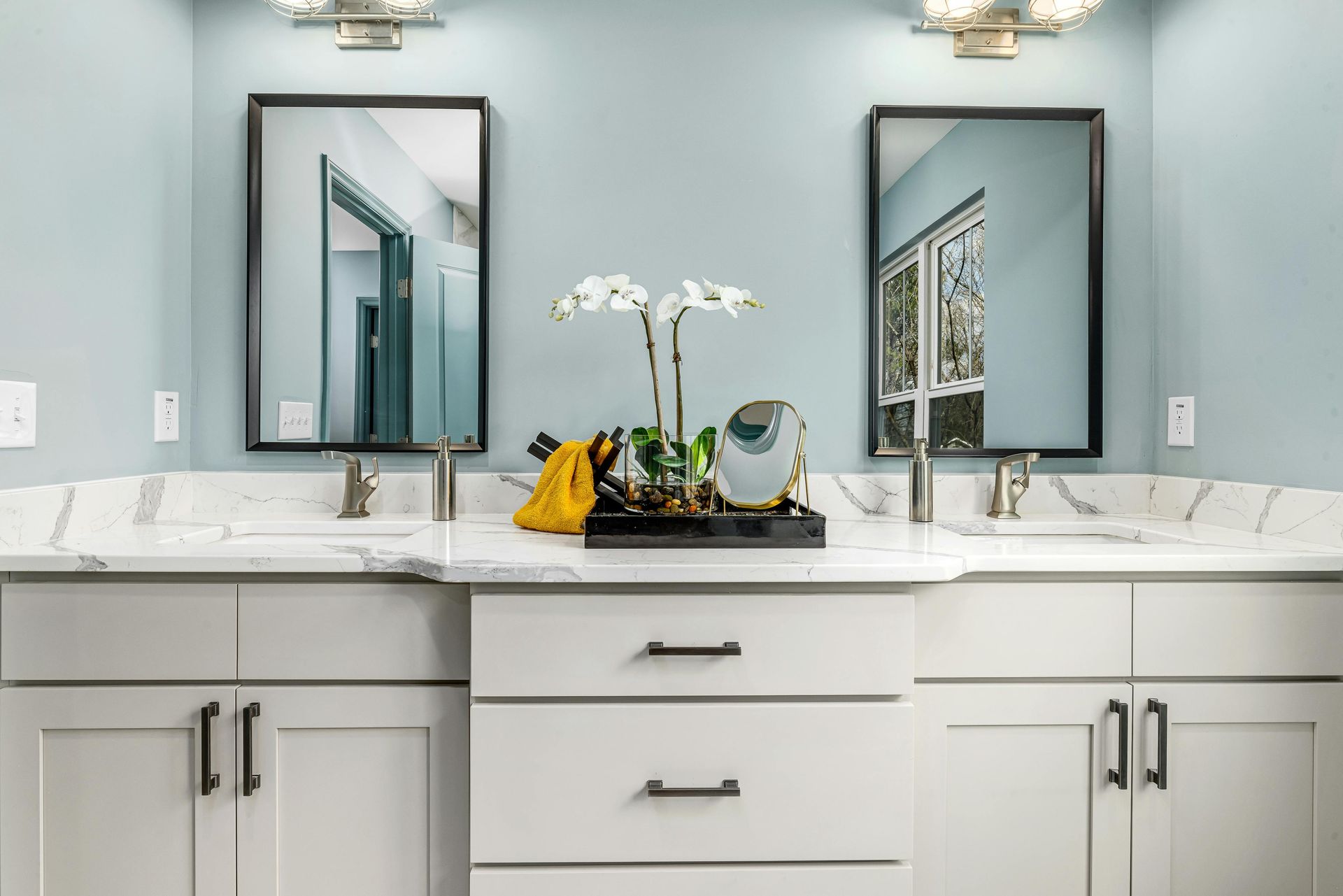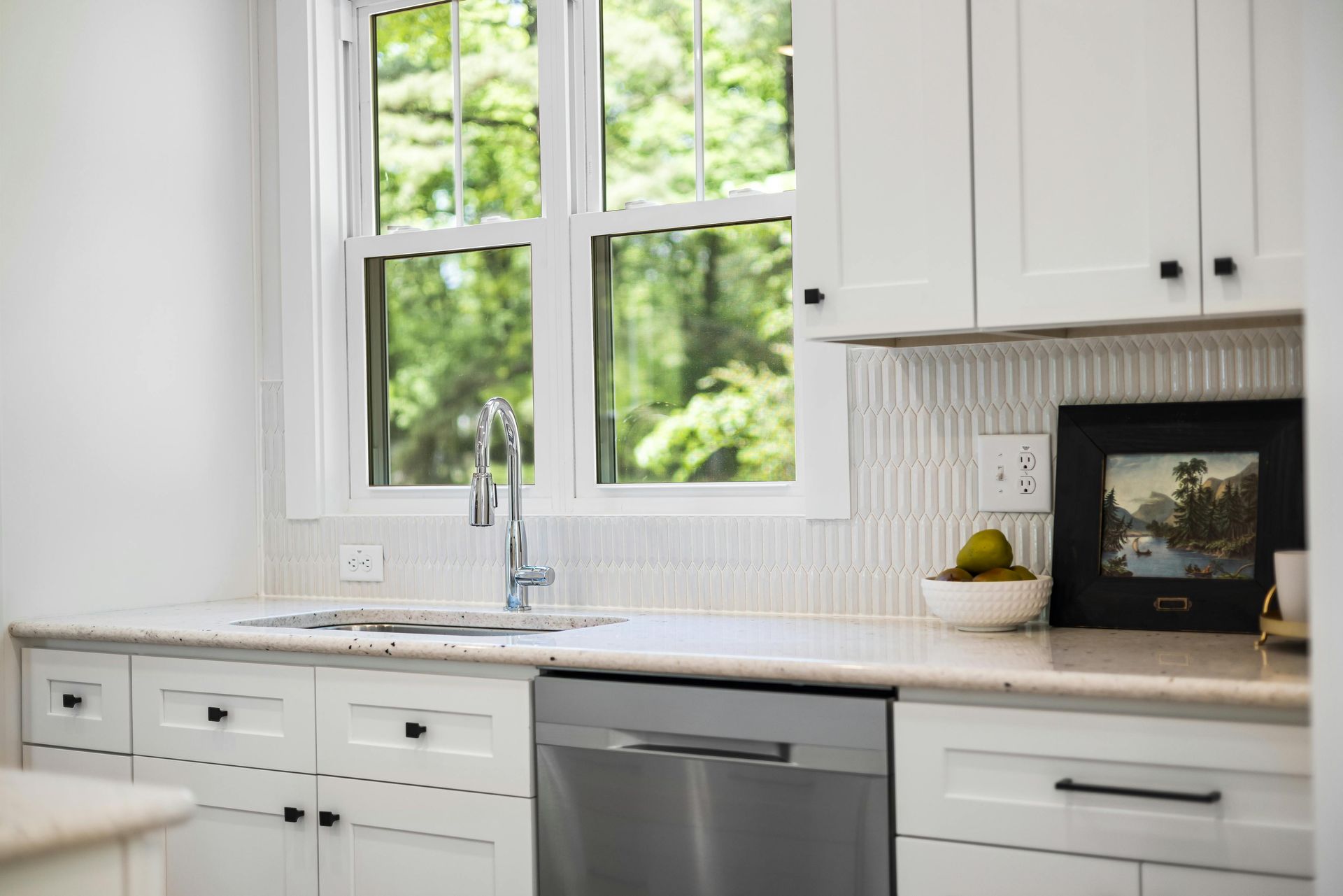
Do Quartz Countertops Need to be Sealed?
October 15, 2024
When considering a quartz countertop for your kitchen or bathroom, one common question that arises is whether or not it needs to be sealed. Unlike natural stone countertops like granite and marble, which require regular sealing to protect against stains and moisture, quartz countertops have different characteristics that make sealing unnecessary.
What Makes Quartz Different?
Quartz countertops are engineered stone surfaces made from a blend of natural quartz crystals, resins, and pigments. The manufacturing process creates a non-porous surface, meaning it doesn’t have small pores or holes that can absorb liquids, dirt, or bacteria. This non-porous nature is one of the key advantages of quartz and makes it more resistant to staining and easier to clean than natural stones.
Why Sealing Isn’t Necessary for Quartz
Since quartz countertops are non-porous, they do not need to be sealed. The resins used during the manufacturing process create a protective barrier that prevents liquids, oils, and other substances from penetrating the surface. In contrast, natural stones like granite and marble have pores that need to be sealed periodically to prevent staining. With quartz, this step is not required, making it a low-maintenance option for homeowners.
The Benefits of Non-Porous Surfaces
The non-porous nature of quartz countertops offers several advantages:
1. **Stain Resistance:** Quartz naturally resists staining from common substances like coffee, wine, and oils, making it a great choice for busy kitchens and bathrooms.
2. **Hygiene:** The lack of pores means that bacteria and germs cannot penetrate the surface, making quartz countertops more hygienic compared to natural stone surfaces.
3. **Low Maintenance:** Because there is no need for regular sealing, quartz countertops are easy to maintain. Simple cleaning with soap and water is usually sufficient to keep them looking great.
What to Avoid With Quartz
Although quartz countertops are durable and resistant to many forms of damage, there are some precautions to keep in mind. Avoid using harsh chemical cleaners, as they can break down the resin and dull the surface over time. Additionally, while quartz is heat-resistant, it’s not heatproof, so it’s best to use trivets or hot pads for hot pots and pans.
In summary, quartz countertops do not need to be sealed due to their non-porous nature. The built-in stain resistance, low maintenance, and hygienic surface make quartz a convenient and popular choice for homeowners looking for a durable countertop material.

November 12, 2024
Your bathroom vanity countertop plays a crucial role in defining the style and functionality of your space. In a bustling city like Chicago, where homeowners prioritize both aesthetics and durability, choosing the right countertop for your bathroom is essential. Here’s a guide to selecting a stylish and durable vanity countertop that will elevate your bathroom and stand the test of time. 1. Why Choose Durable Materials for Your Bathroom Vanity? Bathrooms are high-moisture environments, and countertops are subject to daily use. From water splashes and cosmetics to hot styling tools, a bathroom countertop needs to withstand a lot. For Chicago homeowners, durable materials like quartz, granite, and solid surface are ideal choices. These materials are resistant to scratches, stains, and water damage, making them perfect for long-lasting beauty and functionality in your bathroom. Quartz is especially popular because it’s non-porous, meaning it won’t absorb water or harbor bacteria—a key feature for bathroom hygiene. It’s also available in a wide range of colors and patterns, from subtle neutrals to bold veining that mimics marble. Granite is another resilient option, offering natural beauty and unique patterns that add character to any bathroom. 2. Consider Low-Maintenance Options for a Busy Lifestyle In a fast-paced city like Chicago, homeowners often prefer low-maintenance materials that allow them to spend more time enjoying their homes and less time on upkeep. Quartz is a top choice because it doesn’t require sealing, and a simple wipe-down with a damp cloth keeps it looking pristine. Solid surface countertops, like Corian, also provide a seamless and stain-resistant option that’s easy to clean and repair if scratched. While marble is undeniably beautiful, it’s more porous and prone to staining, making it a higher-maintenance choice. For those who love the look of marble but want something more practical, quartz with marble-inspired patterns offers the best of both worlds: the elegance of marble with the ease of quartz. 3. Optimize Your Bathroom’s Style with Unique Colors and Textures Your bathroom countertop can be a stylish focal point, enhancing the overall aesthetic of the space. Modern bathrooms often favor clean lines and subtle elegance, so choosing a neutral countertop color, such as white, gray, or beige, can provide a timeless look. However, if you’re seeking something bolder, consider a rich, dark quartz or granite countertop to add depth and sophistication. Texture is another way to add style to your vanity countertop. Polished finishes give a smooth, shiny appearance that reflects light beautifully, creating a bright and airy feel in smaller bathrooms. Matte finishes, on the other hand, have a soft, understated elegance and are more forgiving of smudges and fingerprints. 4. Maximize Functionality with Custom Vanity Countertops Custom vanity countertops can be designed to fit your bathroom perfectly, whether you have a compact city condo or a spacious suburban home. Custom options allow you to select the exact dimensions, edge profiles, and sink configurations to optimize your countertop for both style and function. For smaller bathrooms, consider a floating vanity with a slim countertop to make the space feel larger and more open. 5. Invest in Long-Term Value Upgrading your bathroom with a high-quality vanity countertop is an investment that adds value to your home. In Chicago’s competitive real estate market, a well-designed, stylish bathroom can make a strong impression on potential buyers. Quartz and granite countertops, known for their durability and appeal, offer excellent resale value and are widely regarded as premium choices. Transforming your Chicago bathroom with a stylish and durable vanity countertop is a fantastic way to enhance both beauty and function. By choosing a material that suits your lifestyle and design preferences, you can create a bathroom that feels like a luxurious retreat while holding up to daily use.

November 12, 2024
Choosing the right countertop for your Chicago condo or apartment is an exciting opportunity to elevate the style and functionality of your space. Urban dwellers have unique needs when it comes to home design: square footage is often limited, lifestyle is fast-paced, and aesthetic preferences are typically modern and chic. Here’s a guide to help you select the perfect countertop that aligns with your style and meets the demands of condo and apartment living in Chicago. 1. Consider Durability for High-Traffic Spaces In smaller spaces, the kitchen often doubles as a gathering area and workspace, which means your countertop needs to be both durable and functional. Quartz is a popular choice for Chicago homeowners due to its incredible durability and minimal maintenance. It’s non-porous, stain-resistant, and easy to clean, making it ideal for urban settings where time is a luxury. Solid surface materials, like Corian, also offer durability and can be easily customized to fit tight or oddly shaped spaces. 2. Prioritize Low Maintenance for Busy Lifestyles Living in Chicago means you’re likely juggling a busy schedule, so choosing a countertop that doesn’t require constant maintenance is key. Granite and quartz are excellent low-maintenance choices, as they only need occasional sealing (in the case of granite) or a simple wipe-down (in the case of quartz). Marble may look luxurious, but its high maintenance requirements make it less ideal for condo and apartment dwellers who may not have time for frequent upkeep. 3. Maximize Limited Space with Light Colors and Seamless Designs Many condos and apartments in Chicago have smaller kitchens, so it’s essential to choose a countertop color and style that can make the space feel larger and more open. Light-colored countertops, such as whites, creams, and light grays, reflect more light and create an airy feel, which helps maximize limited square footage. Opting for a seamless, unbroken design—without busy patterns or grout lines—can further enhance the sense of spaciousness in a compact kitchen. 4. Add Urban Style with Unique Patterns and Bold Finishes For those looking to make a statement, consider countertops with unique patterns or finishes that reflect the urban vibe of Chicago. Concrete countertops have become increasingly popular, offering an industrial look that suits the modern, minimalist style seen in many downtown apartments. Alternatively, quartz options come in a variety of colors and patterns that mimic natural stone, allowing you to achieve a luxurious look with minimal maintenance. Matte finishes are also trending and can give your kitchen an upscale, contemporary feel. 5. Think About Installation in a High-Rise Building One important factor to consider in a condo or apartment setting is the installation process. High-rise buildings can present challenges for countertop installation due to elevator access, weight restrictions, and limited maneuvering space. Materials like quartz and solid surface are generally easier to work with in tight spaces, while heavier materials like granite may require extra planning. Always consult with a countertop professional to understand what’s feasible within your building’s limitations. 6. Invest in Resale Value with Timeless Choices If you plan to sell your condo or apartment down the line, consider countertops that will appeal to future buyers. Neutral colors, durable materials, and classic styles tend to hold value well and have universal appeal. Quartz and granite, in particular, are popular with potential buyers due to their durability and elegant appearance, making them a wise investment in terms of resale value. Choosing the right countertop for your Chicago condo or apartment doesn’t have to be overwhelming. By focusing on durability, low maintenance, space optimization, and urban style, you can create a beautiful and functional kitchen that fits seamlessly with city living.
Tell us about your next project idea
JB COUNTERTOPS, LLC | Copyright 2023 | All Rights Reserved | Website created by North Shore Web Services